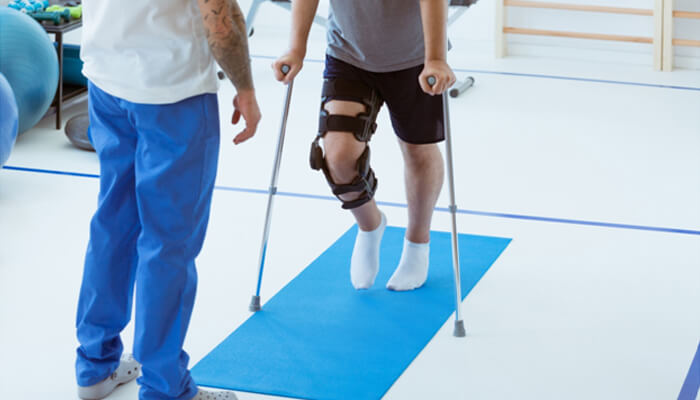Even though 13 car accidents happen every minute throughout the United States, it can be shocking when one happens to you. Perhaps you’ve experienced one recently. Fortunately, though, you walked away seemingly unscathed.
Still, you might be wondering if car accident injuries can show up way later after the wreck. This is a normal phenomenon called “delayed injuries.”
If this is your concern, don’t worry. You’ve come to just the right article to learn more. Keep reading, because we’ve detailed everything you need to know about possible delayed car accident injuries.
Types of Car Accident Injuries
Car accidents can be scary, and they can cause injuries of varying severity. Some injuries may be minor, while others can be life-altering.
It’s important to remember that symptoms may not show up right away. There’s a large variety of car accident injury symptoms you should keep an eye out for.
Then, be prepared to seek medical attention after a car accident even if you don’t feel hurt at first. After all, in 2021 alone, there were 5.4 million injuries due to car accidents.
However, people often delay seeking medical help after accidents for various reasons, such as underestimating the severity of their injuries or concerns about medical expenses. This delay in seeking medical attention can have significant implications, as aside from medical issues, it can complicate insurance claims and legal matters. In such situations, consulting with a legal professional, such as a car accident lawyer, can be crucial to ensure the protection of your rights, proper compensation, and effective navigation of the intricate legal processes that may follow.
What Is Whiplash?
Whiplash is a common injury that can occur during a car accident. It happens when the head and neck suddenly jerk back and forth, causing damage to the soft tissues in the neck.
Whiplash can be caused by a rear-end collision, but can also occur during sports or other physical activities. Symptoms of whiplash may include neck pain, stiffness, headaches, and shoulder pain. Some people may also experience dizziness or ringing in the ears.
While some symptoms may appear immediately, others may not show up for several days or even weeks after the accident. You can treat whiplash with a combination of rest, pain medication, and physical therapy.
A car accident doctor can help assess your condition and confirm the diagnosis of whiplash. Treatment may include pain medications to reduce inflammation and discomfort. Physical therapy can help improve your neck’s range of motion and strengthen the supporting muscles, preventing long-term complications.
Remember to follow your doctor’s orders to avoid exacerbating the injury. With proper care, most people recover fully from whiplash within a few weeks to a few months.
Considering Concussions
A concussion is a type of brain injury that can occur when the head suffers a blow, jolt, or bump. This can happen during a car accident, sports activity, or even from a fall.
When the head is hit, the brain can shift and hit the inside of the skull, causing damage to brain tissue. Symptoms of a concussion can range from mild to severe and may include headache, dizziness, confusion, memory loss, and nausea. It can also cause sensitivity to light or noise, and difficulty sleeping.
It’s important to seek medical attention right away if you suspect you have a concussion. This type of injury can have serious consequences if left untreated. Rest, avoiding physical activity, and following your doctor’s orders is key to recovering from a concussion.
Back or Neck Injuries
These injuries are common during car accidents, too. These types of injuries can involve damage to the muscles, ligaments, and nerves in the back or neck.
You might experience this due to sudden stops, rapid acceleration or deceleration, or direct impact on the back or neck. Symptoms of this injury can include pain, stiffness, and decreased range of motion. You may also experience numbness or tingling in the extremities.
Back and neck injuries can be serious if untreated. With proper medical care, though, most people with these injuries are able to recover fully.
Soft Tissue Injuries
Soft tissue injuries can involve damage to the muscles, tendons, and ligaments in the body. These types of internal injuries can include sprains, strains, and bruises.
You might experience bruising or stiffness in the affected area. Sometimes, though, these internal injuries are hard to detect without the perspective of a healthcare professional. This is why it’s crucial to seek medical attention even if you don’t feel hurt at first.
Psychological Trauma
This type of emotional injury can occur after a traumatic event, such as a car accident. This can include feelings of fear, helplessness, and confusion.
Psychological trauma can be caused by a variety of factors. Examples include witnessing or experiencing a traumatic event, being in a life-threatening situation, or being the victim of a violent crime.
This kind of trauma can vary widely in resulting symptoms. They may include flashbacks, nightmares, anxiety, and depression. It’s possible to also experience feelings of guilt, anger, and irritability.
For these reasons, remember to monitor your emotional well-being after an accident. Be willing to seek professional help if you experience these or similar symptoms later on.
Delayed Symptoms
After a car accident, some symptoms may not show up right away. This can be due to a variety of factors, including the body’s natural response to trauma and shock.
For example, the adrenaline that you released during a traumatic event can mask pain and other symptoms. In addition, some injuries may not become apparent until the swelling and inflammation have subsided. This can take several hours or even days.
Report delayed symptoms to your doctor as soon as you notice them. They may indicate a more serious injury that requires further evaluation and treatment.
Legal Considerations
After a car accident, it’s important to be aware of the statute of limitations for filing a claim. This refers to the period of time in which you must file a lawsuit or claim after the accident. This varies by state, but generally, it’s around two to three years.
Failing to file within this time frame can result in losing the right to compensation for any injuries sustained. Documentation is crucial when it comes to filing a claim. This includes police reports, medical records, and photographs of the accident and any injuries.
It’s also essential to keep track of any expenses related to the accident. These would include medical bills, lost wages, and property damage. This documentation can help to support your claim and ensure that you receive proper compensation.
Insurance companies play a significant role in the aftermath of a car accident. Report the accident to your insurance company as soon as possible. They will investigate the accident and determine who is at fault.
Depending on the circumstances, you may be eligible for compensation. This would be distributed from the other driver’s insurance company.
However, insurance companies are businesses. Keep in mind that their goal is to minimize their payout. They may offer a low settlement or deny your claim altogether.
It’s best to have legal representation when dealing with insurance companies. Doing so might be the best way to ensure that your rights are protected and that you receive fair compensation. Work with experts like those at alphaaccidentlawyers.com for your best chances.
To file a personal injury claim, you should first consult with an experienced personal injury attorney. They can help you navigate the legal process and ensure that your rights are protected.
Preventative Measures
It’s true that car accidents can happen unexpectedly. Still, there are preventative measures that can help reduce the risk of an accident occurring.
Proper car maintenance is an essential step in preventing car accidents. Regularly scheduled maintenance like oil changes, tire rotations, and brake checks can help. Managing these is a great way to ensure that your car is in good working order.
Regular maintenance can also help identify any potential issues. These are key to handle before they become more significant problems that could lead to an accident.
Another preventative measure is safe driving practices. This includes obeying traffic laws, such as speed limits and stop signs. It’s essential to always wear a seatbelt and make sure that all passengers do the same.
Distracted driving is a leading cause of car accidents. So, avoid using your phone or engaging in any other distracting activities while driving. It’s also critical to never drive under the influence of drugs or alcohol.
Remember to stay alert and aware of your surroundings, too. This involves anticipating potential hazards and being prepared to take action to avoid an accident. Keep a safe distance between your car and other vehicles, too.
Defensive driving is a proactive approach to reducing the risk of road accidents. Key principles include maintaining a safe following distance from the vehicle in front, obeying traffic laws, and anticipating potential hazards, including pedestrians, other drivers, or animals. Consistently using mirrors to monitor your surroundings and signaling your intentions with turn signals enhances communication with other drivers.
Furthermore, adjusting your speed to match road and weather conditions is crucial, as is avoiding aggressive driving behaviors and road rage. Planning your route, keeping a safe speed, and preparing for emergencies with an onboard kit are essential components of defensive driving.
Factors to Consider
Several factors can affect how quickly symptoms appear after a car accident. Age can be a significant factor, as older adults may take longer to recover from injuries and may be more likely to experience delayed symptoms.
Similarly, pre-existing medical conditions can make it more difficult to diagnose car accident injuries. Some symptoms may be attributed to an existing condition rather than the accident itself.
Long-Term Effects
Car accidents can have long-term effects on a person’s physical and emotional well-being. One of the most common long-term effects is chronic pain. This can develop as a result of injuries sustained in the accident.
This can include back pain, neck pain, and headaches, among other symptoms. Chronic pain can have a significant impact on a person’s quality of life. It can make it more difficult to work or engage in everyday activities.
Car accidents can also result in disability, particularly if the injuries sustained are severe or impact the spine or brain. Disabilities can affect a person’s ability to work, care for themselves, and enjoy life to the fullest.
Emotional trauma is another potential long-term effect of a car accident. The emotional impact of an accident can be significant. This is particularly true if the accident was severe or resulted in the loss of a loved one.
Symptoms of emotional trauma can include anxiety, depression, and post-traumatic stress disorder (PTSD). It’s important for individuals to seek support and treatment for emotional trauma as well as physical injuries. This can take the form of going to support groups or joining online forums where people have dealt with similar struggles.
Possible Compensation
Perhaps you’ve been mildly or seriously injured in a car accident. If so, you may get compensation for your injuries and other losses. There are several types of compensation available.
1. Medical expenses: the cost of any medical treatment you received as a result of your injuries, such as hospital bills, doctor’s visits, and prescription medication
2. Lost wages: if your injuries prevent you from working, you may get to receive compensation for any wages you lost as a result
3. Pain and suffering: this can compensate you for the physical pain and emotional suffering you experienced as a result of the accident
4. Property damage: if your vehicle or other property incurred damage in the accident, you may get compensation for the cost of repairs or replacement
The amount of compensation you receive will depend on a variety of factors. These could include the severity of your injuries, the extent of your property damage, and the impact of the accident on your life.
Compensation is typically determined through negotiations between your attorney and the insurance company. It could also be through a court settlement or judgment.
It’s important to work with an experienced personal injury attorney. They’ll be able to help you understand your legal rights and pursue the compensation you deserve. By seeking compensation for your losses, you can take steps to rebuild your life after a car accident.
Filing an Insurance Claim
One of the first steps after a car accident is to file an insurance claim. To do so, you will need to contact your insurance company. You’ll provide them with information about the accident.
These details include the date, time, location, and names of any other drivers involved. You will also need to provide them with a copy of the police report.
Once you’ve filed your claim, an insurance adjuster will work on your case. This person will investigate the accident and determine who was at fault. They will also evaluate your injuries and damages.
During the claims process, stay honest and transparent with your insurance company. This includes providing them with accurate information about your injuries and medical treatment, as well as any pre-existing conditions you may have had.
A car accident doctor plays a vital role in supporting your personal injury claim by offering comprehensive medical records containing diagnoses, treatment plans, and essential medical reports to establish injury severity.
These medical records, along with bills and treatment receipts, are crucial evidence for quantifying the economic damages resulting from the accident. Furthermore, in certain instances, a car accident doctor may testify as an expert witness in court to elucidate the nature and consequences of your injuries to the judge or jury.
Continue Your Research
When car accident injuries surface way after the event itself, they can be confusing. By taking the right steps, though, you can ensure you get the treatment and legal compensation you might deserve.
It’s advice like this that makes this blog so important for responsible citizens like you. Subscribe and follow now so that you never miss an opportunity to better your situation or overall quality of life.




